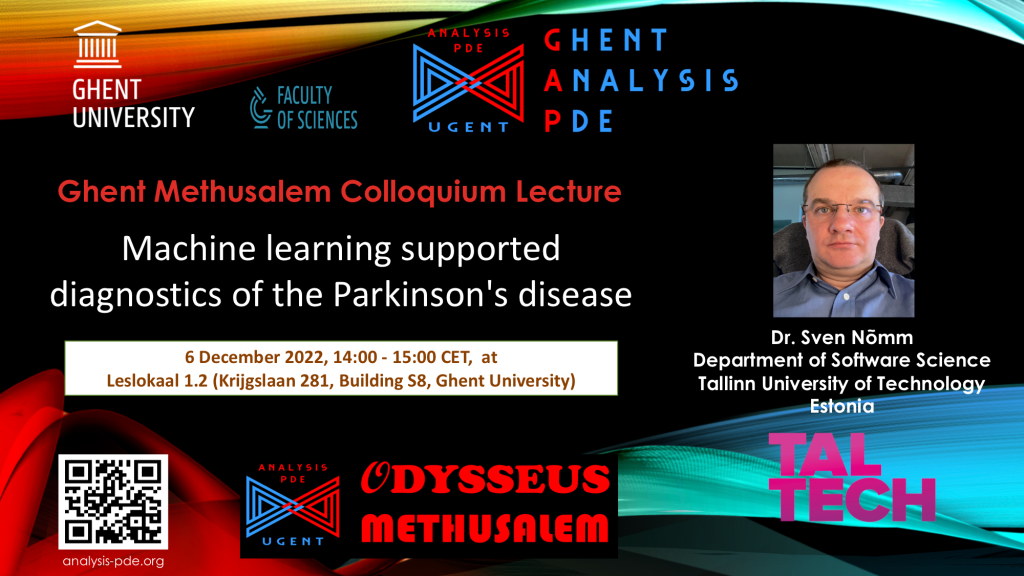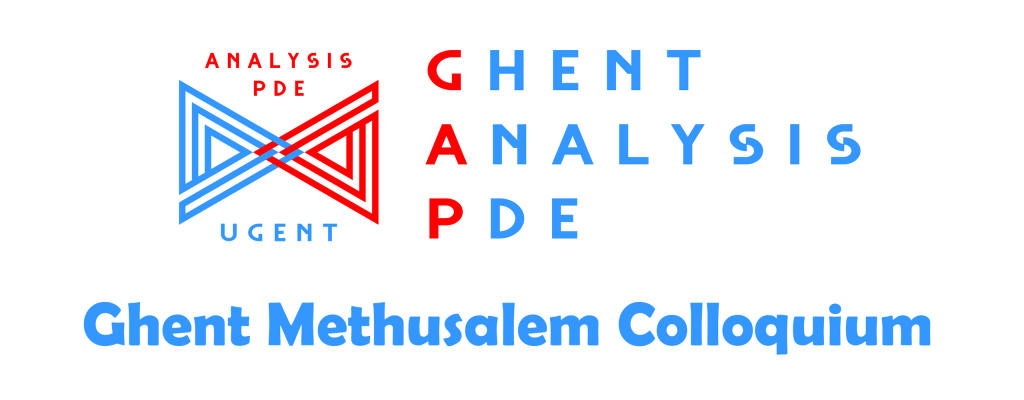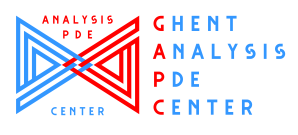
The Ghent Methusalem Colloquium is intended for a broad audience of PhD students, postdocs and professors at the Ghent Analysis & PDE Center and beyond. The series includes colloquia from visiting and invited guests.
Extended abstracts of the talks given within this colloquium appear as volumes in the Birkhäuser series Research Perspectives Ghent Analysis and PDE Center
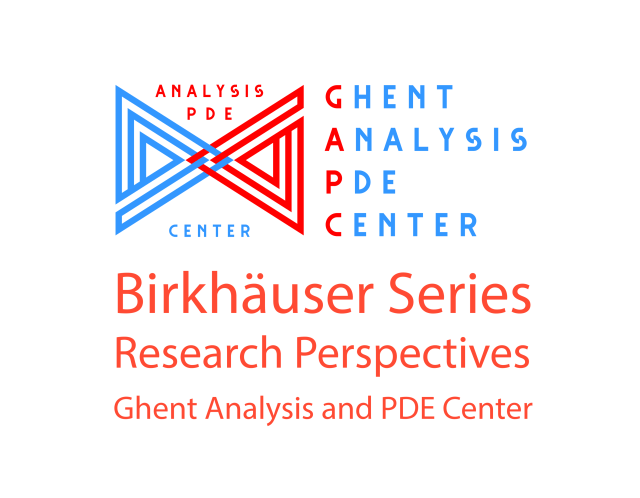
Methusalem Colloquium Lectures:
Prof. Sandro Coriasco
Università degli Studi di Torino, Italy
Topic: Global hypoellipticity for a class of time-periodic evolution operators on asymptotically Euclidean manifolds
Time: 11:00 – 12:00 CEST (September 4, 2025)
Where: Leslokaal 3.2 (Krijgslaan 281, Building S8, Ghent University)
We study the hypoellipticity of a class of time-periodic, time-dependent evolution operators, acting on spaces defined on T x X, where T is the one-dimensional torus and X is an asymptotically Euclidean manifolds. Our results are related to so-called Diophantine conditions, involving the sequence of eigenvalues of an associated elliptic operator on X. This is joint work with F. de Ávila Silva and M. Bonino.

Dr. Arick Shao
Queen Mary University of London
Topic: Scattering and Asymptotics for Critically Weakly Hyperbolic and Singular Systems
Time: 14:30 – 15:30 CET (14 and 15 April, 2025)
Where: Leslokaal 3.1 (Krijgslaan 281, Building S8, Ghent University)
We study a very general class of first-order linear hyperbolic systems that both become weakly hyperbolic and contain singular lower-order coefficients at a single time t = 0. In critically weakly hyperbolic settings, it is well-known that solutions lose a finite amount of regularity at t = 0. Here, we both improve upon the analysis in the weakly hyperbolic setting, and we extend this analysis to systems containing critically singular coefficients, which may also exhibit modified asymptotics and regularity loss at t = 0. In particular, we give precise quantifications for (1) the asymptotics of solutions as t approaches 0, (2) the scattering problem of solving the system with asymptotic data at t = 0, and (3) the loss of regularity due to the degeneracies at t = 0. Finally, we discuss a wide range of applications for these results, including weakly hyperbolic wave equations (and equations of higher order), as well as equations arising
from relativity and cosmology (e.g. at big bang singularities).
This is joint work with Bolys Sabitbek (QMUL).
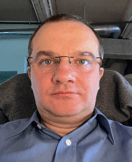
Dr. Sven Nõmm
Tallinn University of Technology, Estonia
Topic: Transformers
Time: 11:00 – 12:00 CET (5 December, 2023)
Where: Leslokaal 3.2 (Krijgslaan 281, Building S8, Ghent University)
During the last year, deep learning Transformers have attracted a lot of attention. While Chat-GPT and Google Bard are probably the most famous applications of Transformers, areas such as natural language processing (NLP) have benefited from these models for more than five years. Developing in NLP laboratories as large language models (LLMs), transformers quickly gained popularity among researchers in many different areas. Surprisingly, the mathematical machinery that powers these models is based on very simple methods. In this talk, we will briefly describe the predecessor techniques and their weaknesses. Then, transformer model and all its components will be considered in detail.
Prof. Dmitriy Zanin
School of Mathematics and Statistics, UNSW Sydney, Australia
Topic: Principal symbol calculus on contact manifolds
Time: 10:00 – 11:00 CET (15 November, 2023)
We construct the principal symbol mapping for the operators acting , where
is the Heisenberg group. Contact manifolds are locally modelled by Heisenberg group. Our aim is to construct the principal symbol mapping for the operators acting on
with contact
. To do this, we establish the equivariant behavior of the principal symbol under Heisenberg diffeomorphisms.
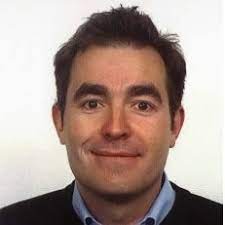
Prof. Christophe Geuzaine
Dept. of Electrical Engineering and Computer Science, University of Liège, Belgium
Topic: Non-reflecting boundary conditions and domain decomposition methods for industrial flow acoustics
Time: 11:00 – 12:00 CET (22 June, 2023)
Where: Leslokaal 3.1, Krijgslaan 281, Building S8, Ghent University
This talk is devoted to non-overlapping Schwarz domain decomposition methods for the resolution of high frequency flow acoustics problems of industrial relevance. First, we will present recent advances on non-reflecting boundary techniques that provide local approximations to the Dirichlet-to-Neumann operator for convected and heterogeneous time-harmonic wave propagation problems. Then we will show how to adapt a generic domain decomposition framework to flow acoustics, based on these newly designed transmission conditions, and highlight the benefit of the approach on the simulation of three-dimensional noise radiation of a high by-pass ratio turbofan engine intake.

Methusalem day: Differential and integral equations
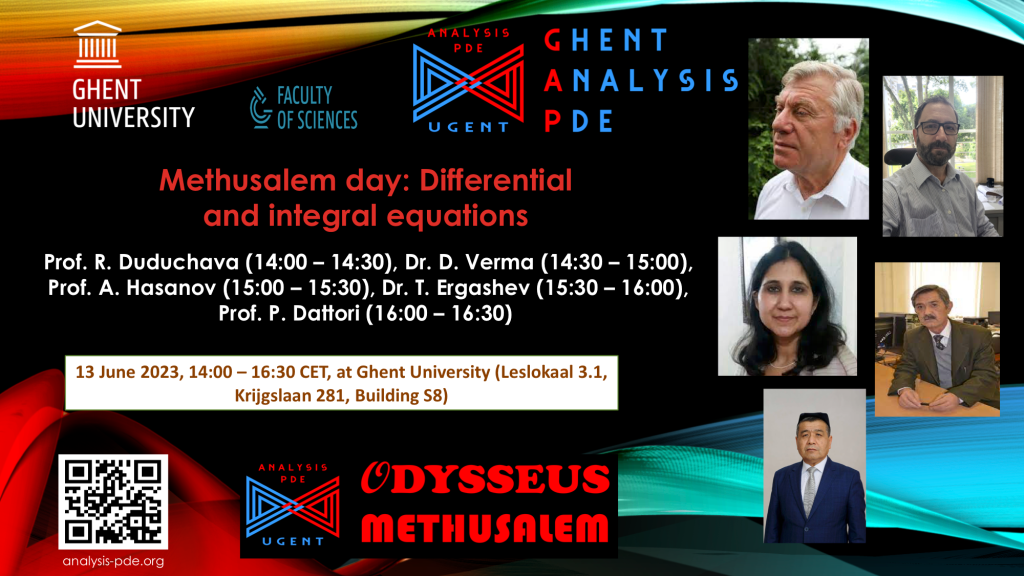
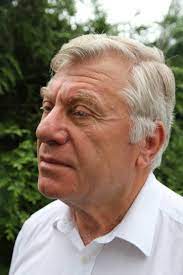
Prof. R. Duduchava
Institute of Mathematics, The University of Georgia and A. Razmadze Mathematical Institute, Tbilisi, Georgia
Topic: Generic Bessel potential spaces on Lie groups and their applications
Time: 14:00 – 14:30 CET (June 13, 2023)
Where: Krijgslaan 281, Building S8, Ghent University
The purpose of the presentation is to discuss the role of adapted Bessel potential space to the structure of underlying Lie group, defined based on generic differential operators from the Lie algebra of the Lie group. Such generic Bessel potential spaces are well adapted to the investigation of integro-differential (of pseudo-differential) operators on Lie groups.
We will expose several examples of Lie groups and corresponding generic Bessel potential spaces and then concentrate on the investigation of boundary value problems (BVPs) for the Laplace-Beltrami equation on a hypersurface with the Lipschitz boundary
, containing a finite number of angular points (knots)
of magnitude
,
. The Dirichlet, Neumann and mixed type BVPs are considered in a non-classical setting, when solutions are sought in the generic Bessel potential spaces (GBPS)
,
,
with weight
. By the localization the problem is reduced to the investigation of Model Dirichlet, Neumann and mixed BVPs for the Laplace equation in a planar angular domain
of magnitude
,
. Further the model problem in the GBPS with weight
is investigated by means of Mellin convolution operators on the semi-axes
. Explicit criteria for the Fredholm property and the unique solvability of the initial BVPs are obtained and singularities of solutions at knots to the mentioned BVPs are indicated. In contrast to the same BVPs in the classical Bessel potential spaces
, the Fredholm property in the GBPS
with weight is independent of the smoothness parameter
.
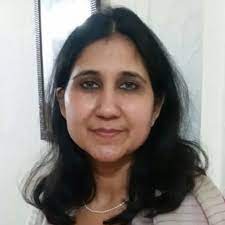
Dr. D. Verma
University of Delhi, India
Topic: Hardy inequalities for different operators on metric measure spaces
Time: 14:30 – 15:00 CET (June 13, 2023)
Where: Krijgslaan 281, Building S8, Ghent University
I will begin with the several characterization of weights for the Hardy inequality on and
. With this, moving on to the cases for different weight characterization for the Hardy inequality on Metric measure spaces for the different parameters
and
. I will give several examples of the obtained results, finding conditions on the weights for integral Hardy inequalities on homogeneous groups, as well as on hyperbolic spaces and on more general Cartan-Hadamard manifolds.
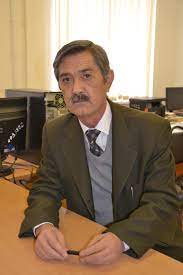
Prof. A. Hasanov, Uzbek Academy of Sciences, Tashkent, Uzbekistan
Topic: Special functions and differential equations
Time: 15:00 – 15:30 CET (June 13, 2023)
Where: Krijgslaan 281, Building S8, Ghent University
In this work, using a Kelvin-Voigt model, self-similar solutions of the equation of transverse vibrations of a viscoelastic beam with a variable height are determined. Further, generalized two-dimensional functions of the Mittag-Leffler type are introduced. We paid special attention to functions
as limiting cases of functions
Following the Horn method, we determine all possible cases of the convergence region of the function
. Euler-type integral representations are given for the function
. The one-dimensional and two-dimensional Laplace transforms of the function are also defined. A system of differential equations in partial derivatives is constructed, which is related to the function
.
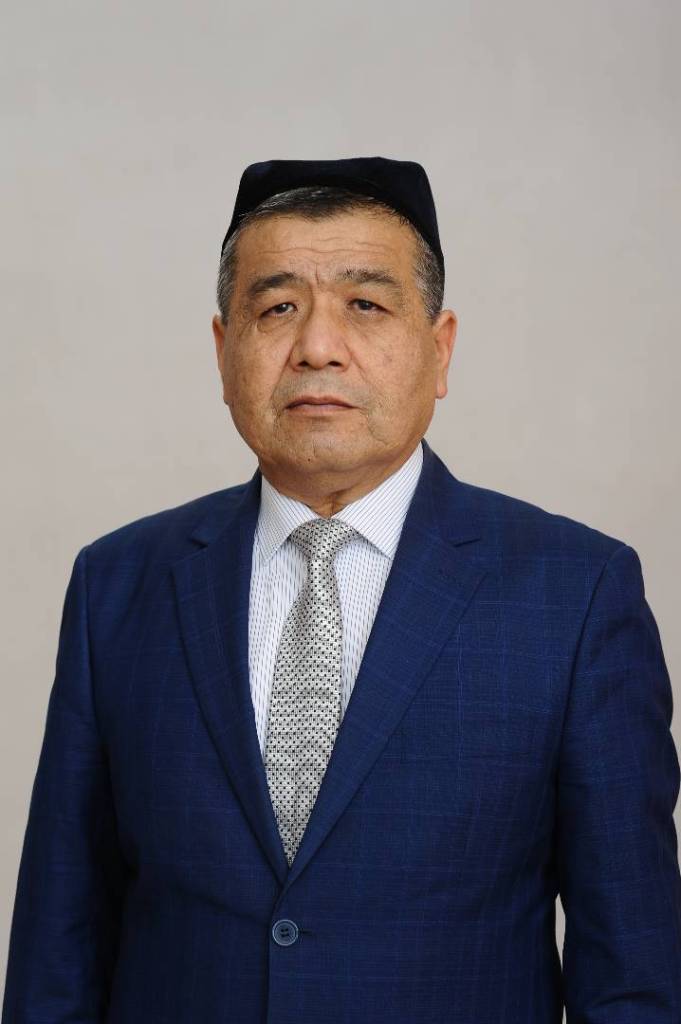
Dr. T. Ergashev, Tashkent Institute of Irrigation and Agricultural Mechanization Engineers, Uzbekistan
Topic: Multiple hypergeometric functions and their applications for solving boundary value problems for degenerating PDE
Time: 15:30 – 16:00 CET (June 13, 2023)
Where: Krijgslaan 281, Building S8, Ghent University
Hypergeometric functions in one and more variables occur naturally in a wide variety of problems in applied mathematics, statistics, operations research, theoretical physics, and engineering sciences. A number of interesting applications of hypergeometric functions in one and more variables in queuing theory and related stochastic processes are known. There are many works on the multiple hypergeometric functions which are motivated by various physical and quantum chemical applications of such functions. Especially, many problems in gas dynamics lead to solutions of degenerate second-order partial differential equations which are then solvable in terms of multiple hypergeometric functions.
In this work, hypergeometric functions of two and three variables are discussed, their properties and applications are studied.
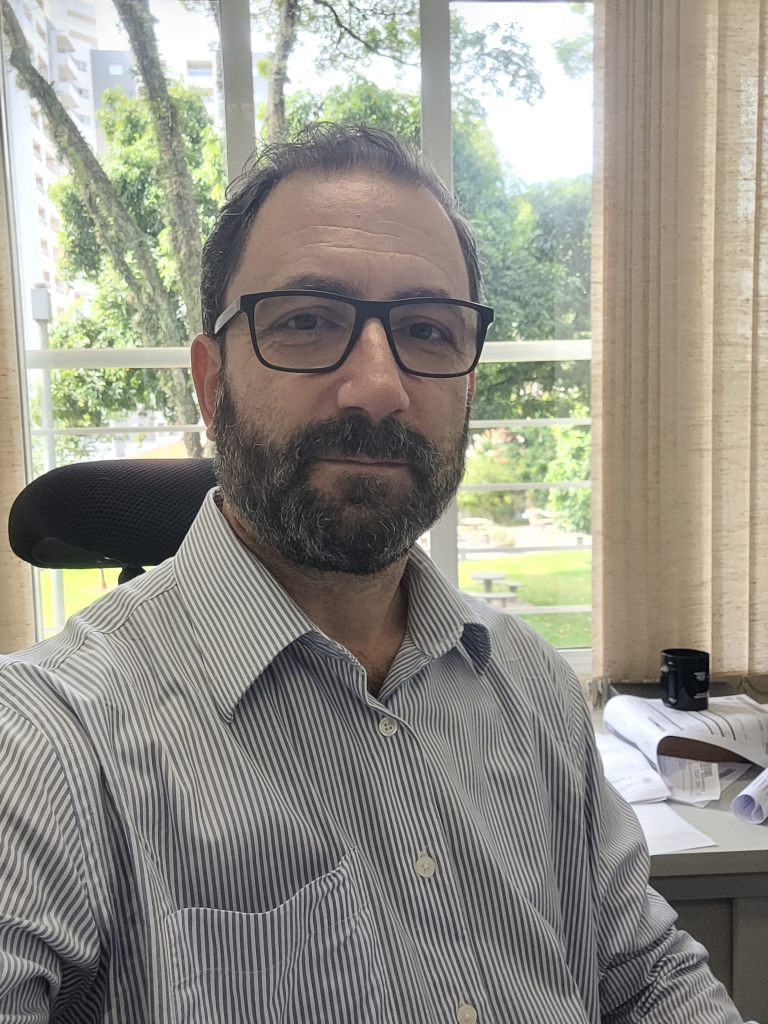
Prof. Dr. P. Dattori da Silva, University of Sao Paulo at Sao Carlos (ICMC-USP) – Brazil
Topic: Gevrey solvability for a class of elliptic vector fields with degeneracies
Time: 16:00 – 16:30 CET (June 13, 2023)
Where: Krijgslaan 281, Building S8, Ghent University
Let be a complex vector field defined on
, where
is the unit circle, and
and
are real-valued real-analytic functions. The characteristic set of the structure associated with
, denoted here by
, is the set of all points
where
fails to be elliptic.
Let . We will assume that
and
for
and for all
. Hence,
and that each point in
is of infinite type. Under our assumptions
satisfies the well-known condition~
of Nirenberg-Treves.
In this talk we will address to the solvability of the equation when
is a Gevrey function on
.
Recall that, given , a complex-valued infinitely differentiable function
is an
-Gevrey function on
if for every compact subset
of
there exist positive constants
and
such that, for all
and all
one has We denote by
the space of all
-Gevrey functions on
, hence
is the space of real-analytic functions on
.
The local solvability is well-understood.
We will present results concerning the solvability in a full neighborhood of , in the following sense: given
we say that
is
-solvable at
if for any
belonging to a subspace of finite codimension of
there exists a solution
to the equation defined in a neighborhood of
.
This is a joint work with Adalberto Bergamasco (ICMC-USP) and Gabriel Araújo (ICMC-USP).
The author was partially supported by CNPq, Capes, and FAPESP.
Mini course
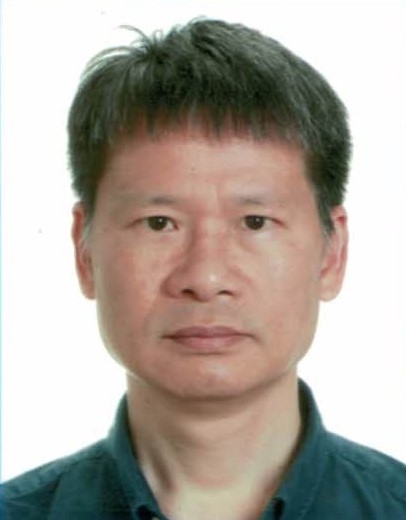
Prof. H.-Q. Li
Department of Mathematics, Shanghai, China
Topic: Heat kernel asymptotics on step-two Carnot groups: I, II
Time: 15:00 – 16:00 CET (June 6 and 8, 2023)
Where: Krijgslaan 281, Building S8, Ghent University
The heat semi-group and its kernel play a crucial role in various areas of Mathematics. For instance, we can use its small-time asymptotic behaviours to study geometric properties of the underlying space, such as the squared distance, the cut locus, etc. In this talk, we consider uniform heat kernel asymptotics on two toy model: the Heisenberg group and the free step-two Carnot group with 3 generator. At least in principal, we provide a powerful method in the setting of step-two Carnot groups. The method also allow us to study the Riemannian heat kernel and geometric properties on step-two Carnot groups.

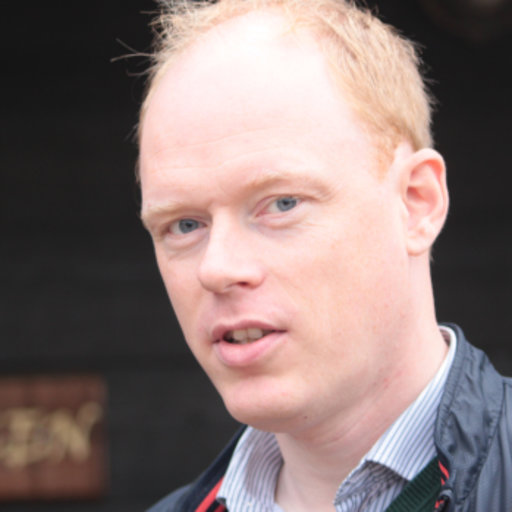
Prof. Chris Stolk
University of Amsterdam, Netherlands
Topic: Asymptotic analysis for efficiently solving the Helmholtz equation
Time: 15:00 – 16:00 CET (June 1, 2023)
Where: Leslokaal 3.1, Krijgslaan 281, Building S8, Ghent University
In the limit of high frequency, time-harmonic wave equations are difficult to solve. We discuss asymptotic solutions to certain difference equations using ideas from microlocal analysis. The ideas are applied to obtain efficient discretizations of the Helmholtz equation. To get numerical results for these, large linear systems need to be solved. Domain decomposition methods reduce the problem of solving such a linear system to a problem of solving many smaller linear systems. We discuss theoretical and numerical results. Between these there is still a large gap in the sense that good numerical results are obtained in cases which are not covered by the theory.
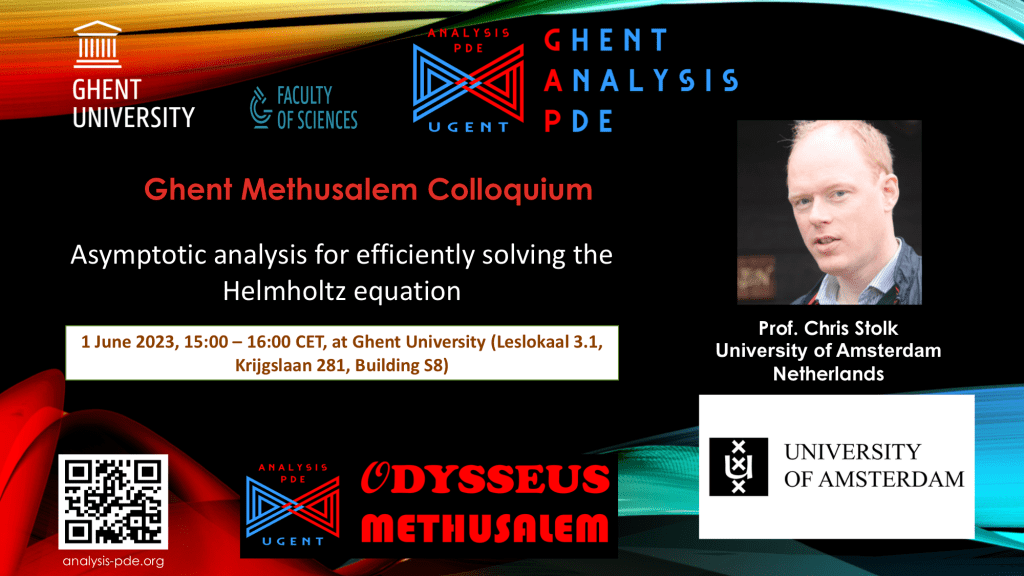

Prof. Jérôme Le Rousseau
Sorbonne Paris Nord University, France
Topic: Stabilization and control: past and present
Time: 15:00 – 16:00 CET (25 May 2023)
Where: Leslokaal 3.1, Krijgslaan 281, Building S8, Ghent University
We will review topics in stabilization, a subject that goes way back in history. Classical results will be presented and we will focus on the wave equation, for which microlocal analysis yields a precise characterization, using semi-classical measures to express possible concentration phenomena.
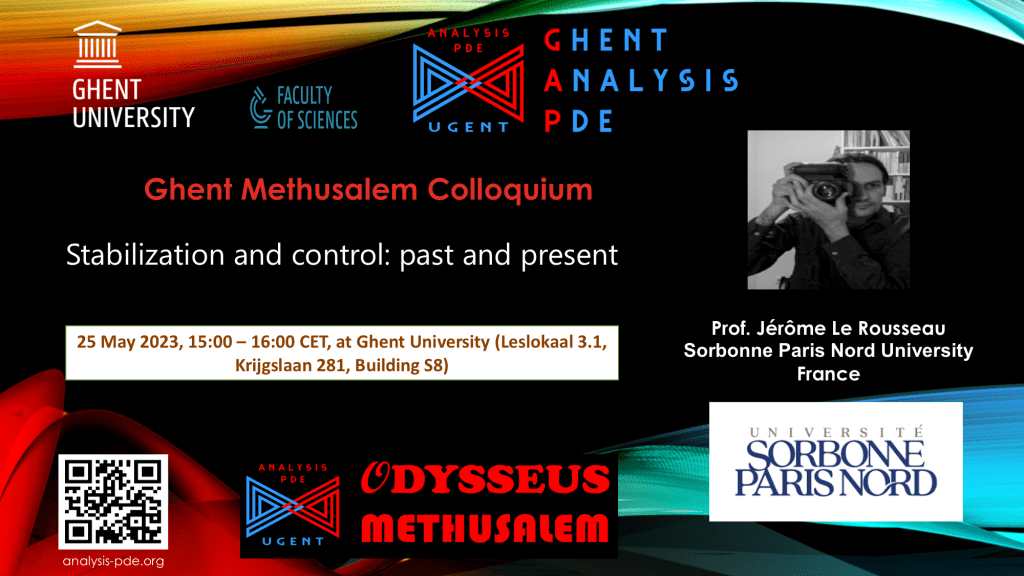
Mini course

Prof. S. Thangavelu
Department of Mathematics, Indian Institute of Science, India
Topic: A scalar valued Fourier transform for Heisenberg groups
Time: 10:00 – 11:00 CET (9 May 2023), 15:00 – 16:00 CET (11 May 2023) and 15:00 – 16:00 CET (16 May 2023)
Where: Krijgslaan 281, Building S8, Ghent University
The standard way of defining group Fourier transform on the Heisenberg group leads to an operator valued function on the unitary dual which is identified with the set of all non-zero reals
As this definition is unwieldy, it is not suitable for certain purposes. Hence, we propose a scalar valued Fourier transform on the Heisenberg fan which is related to the joint spectral theory of the sub-Laplacian
and the operator
corresponding to the center of the Heisenberg Lie algebra. We will prove the usual properties expected of a Fourier transform for this one which we call Strichartz Fourier transform.

Methusalem PDE week
Mini-course
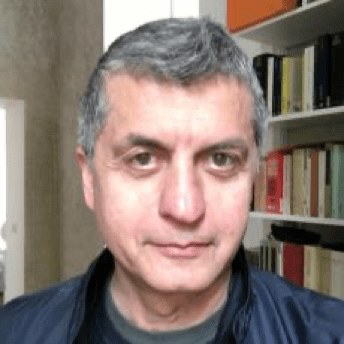
Prof. Piero D’Ancona
Department of Mathematics, Sapienza University of Rome, Italy
Topic: Scattering for NLS: a short overview
Time: 15:00 – 16:00 CET (18 April 2023) and 10:30 – 12:00 CET (20 April, 2023)
Where: Leslokaal 3.1 (Krijgslaan 281, Building S8, Ghent University)
The NLS equation is a nonlinear partial differential equation that arises in many areas of mathematics and physics. It is a type of Schrödinger equation, which is an equation that describes the evolution of quantum mechanical systems. The equation is commonly used to model the propagation of light pulses through optical fibers, and is also used to model other phenomena such as water waves, Bose-Einstein condensates, and fermionic systems. Scattering theory describes the behaviour of waves for large times.
The course will touch the following topics, some of them rapidly, a few in greater detail:
1. Long-time behaviour of the linear flow, Strichartz estimates
2. Global existence and uniqueness of solutions for NLS
3. The mathematical formulation of scattering
4. Classical proofs of scattering
5. Concentration compactness and the Kenig-Merle approach
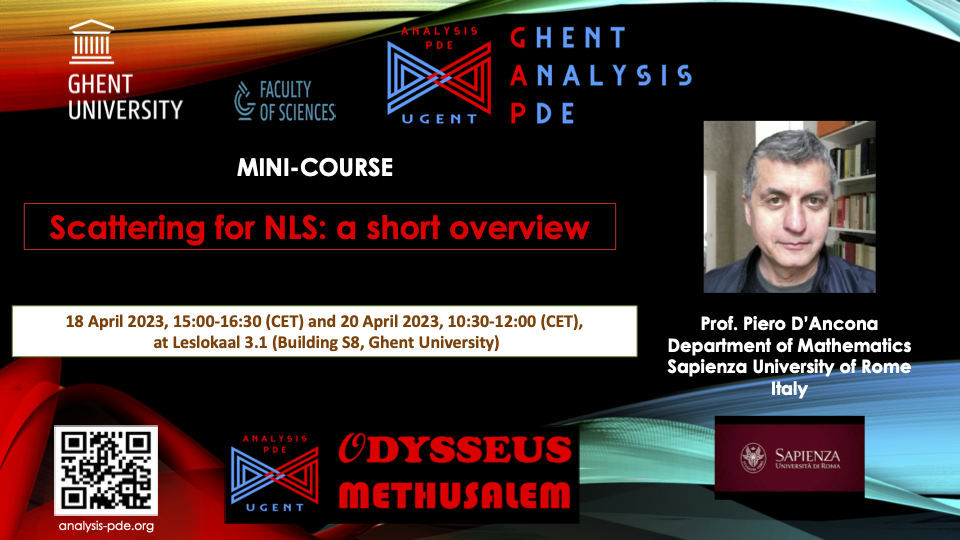
Methusalem Colloquium Lecture
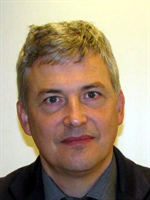
Prof. Dr. Sorin Pop
Hasselt University, Belgium
Topic: Non-equilibrium models for flow in porous media
Time: 15:00 – 16:00 CET, 20 April 2023
Where: Leslokaal 3.1 (Krijgslaan 281, Building S8, Ghent University)
Porous media flows appear in several fields of highest societal relevance, such as environmental engineering, energy resources management, flow through biological tissues. The underlying mathematical models can be expressed as (systems of) evolution equations, having a nonlinear and possibly degenerate character.
Next to the underlying conservation laws for mass, momentum, etc., one typically assumes that the unknowns in such models (e.g. the capillary pressure and the saturation) are connected through an algebraic relationship, obtained under equilibrium conditions. E.g., for a given medium and at a given saturation of the, say, wetting phase, the capillary pressure will always take the same value. Such an assumption is, however, invalidated by several experimental results reported in the literature. More precisely, as the solution satisfies a maximum principle, and some stability estimates in various energy norms, such equilibrium-based porous media flow models rule out the formation of so-called saturation overshoots, or of finger-like patterns, which are observed experimentally. This motivates extending the models commonly used in the literature by incorporating non-equilibrium effects like dynamic capillarity or hysteresis.
After providing the application background, in this presentation we briefly present some qualitative properties for such models, and discuss various numerical techniques that are used to approximate the solution. This includes a domain decomposition method combined with a linearization approach for solving the emerging, time discrete equations. The approach builds on the Schwarz non-overlapping decomposition scheme and on an L-type iterative linearization method.

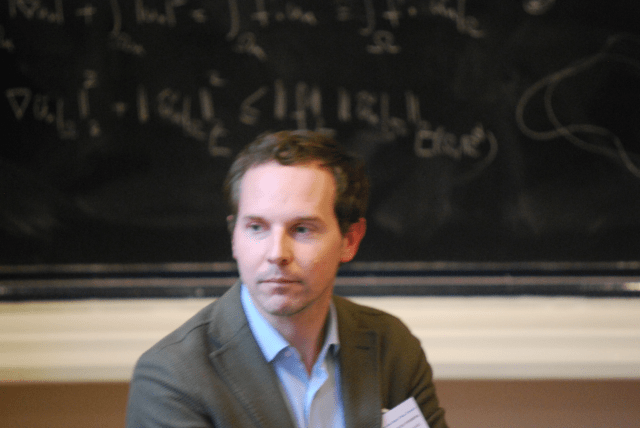
Prof. David Dos Santos Ferreira
Institut Élie Cartan, Université de Lorraine, France
Topic: The anisotropic Calderón problem
Time: 15:00 – 16:00 CET, 21 March 2023
Where: Leslokaal 3.1 (Krijgslaan 281, Building S8, Ghent University)
Calderón’s inverse conductivity problem is whether one can determine the electrical conductivity inside a body by making voltage and current measurements at the boundary. The anisotropic inverse problem is when the conductivity is a matrix field. There is a nice geometrical formulation of this problem : in a compact Riemannian manifold with boundary, is the metric determined (modulo isometries which keep points of the boundary fixed) by the Cauchy data of harmonic functions? I will describe attempts to deal with this inverse problem in a conformal class under structural and geometric assumptions on the metric following the path opened by Sylvester and Uhlmann in the Euclidean / isotropic setting. This will relate to other geometric tomography problems. The anisotropic Calderón problem
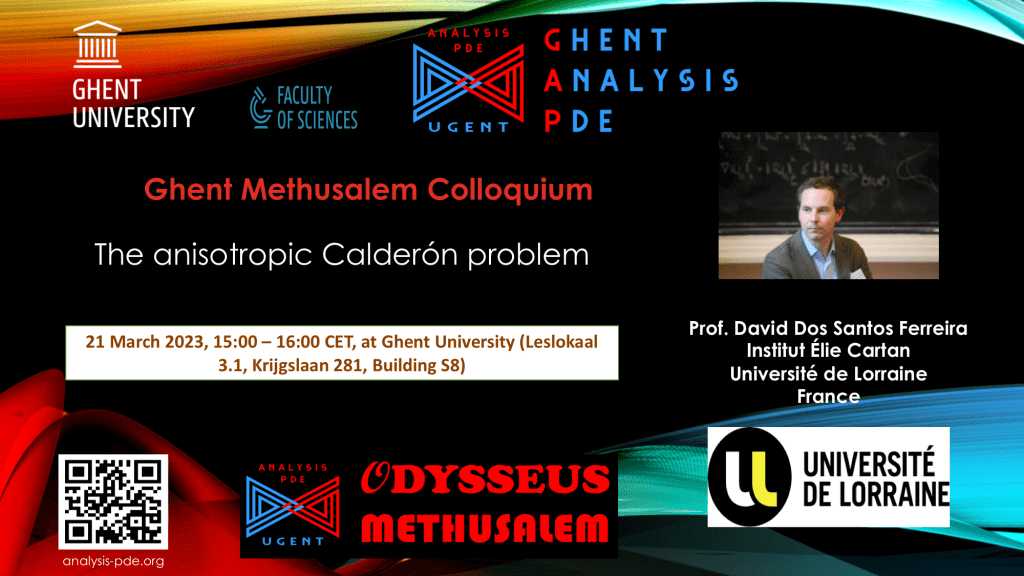
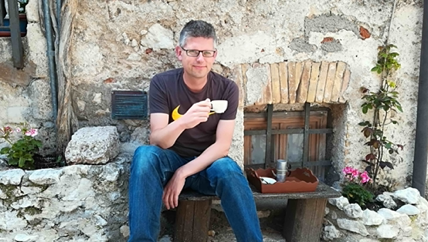
Prof. Bob Rink
Vrije Universiteit Amsterdam, The Netherlands
Topic: Integrability vs. thermalization in the Fermi-Pasta-Ulam-Tzingou problem
Time: 10:00 – 11:00 CET, 14 March 2023
Where: Leslokaal 3.2 (Krijgslaan 281, Building S8, Ghent University)
In 1955, Fermi, Pasta, Ulam and Tzingou were interested in the dynamics of nonlinear physical systems with a large number of degrees of freedom. They decided to investigate a conservative chain of interacting oscillators in one of the first numerical simulations in history. The outcome of their experiment was quite astonishing: instead of a slow driving to a so-called “thermal equilibrium”, they observed recurrent behavior. Since then, different approaches were able to unveil and explain features of their observations, most notably using integrable PDE approximations and KAM theory. In this talk I will give an overview of some cornerstone results on the analysis of the problem, including their shortcomings, and present some recent advances of Antonio Ponno (Padova), Matteo Gallone (SISSA Trieste) and myself.
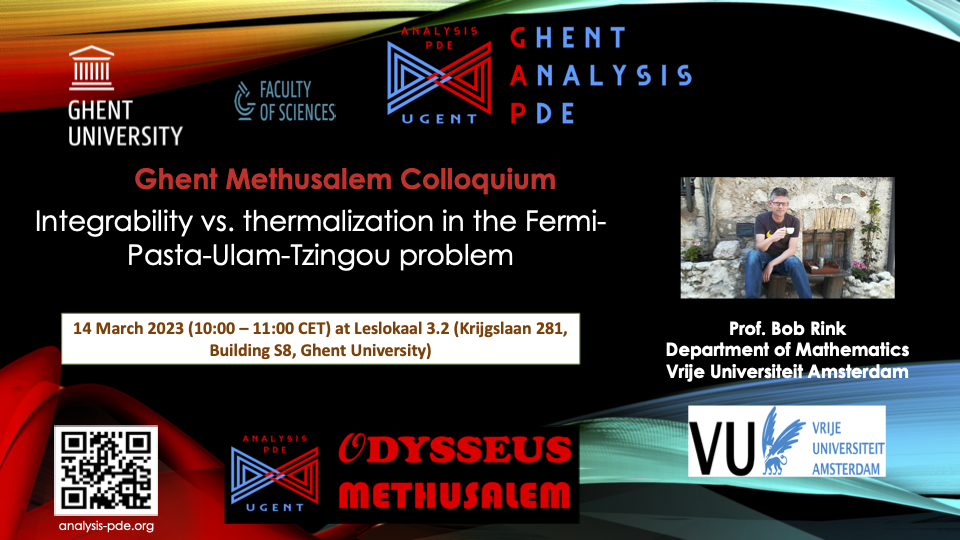
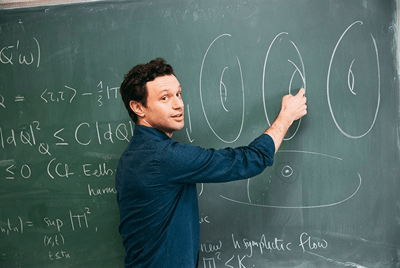
Prof. Joel Fine
Université Libre de Bruxelles, Belgium
Topic: What does the Alexander polynomial know about minimal surfaces?
Time: 11:00 – 12:00 CET, 2 March 2023
Where: Leslokaal 3.1 (Krijgslaan 281, Building S8, Ghent University)
In recent years there has been a lot of interest in using solutions to certain classes of degenerate PDE to investigate questions in geometry and topology. I will try and explain this by way of an example: minimal surfaces in 4-dimensional hyperbolic space which meet the sphere at infinity in a knot. Counting these surfaces should define a knot invariant. I will explain the conjecture that these counts of minimal surfaces should give the coefficients of the Alexander polynomial. The Alexander polynomial is a simple combinatorial invariant of a knot. If the conjecture is true, then easy combinatorial calculations will count the number of minimal surfaces, i.e. solutions to a complicated non-linear uniformly degenerate PDE. Working towards this conjecture, I will explain what is known and what is left to be done. No prior knowledge of knots, the Alexander polynomial or minimal surfaces will be assumed.
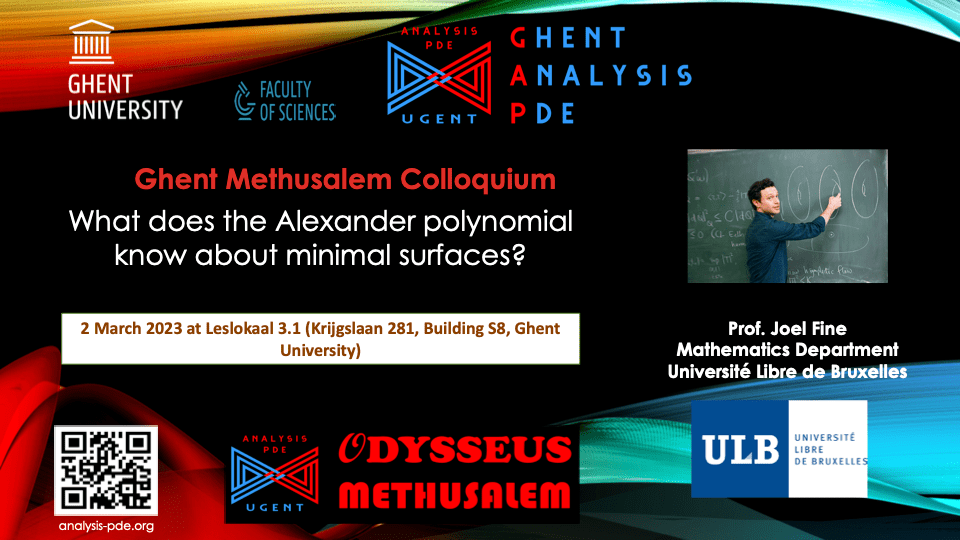

Prof. Sonja Hohloch
University of Antwerp, Belgium
Topic: Integrable Hamiltonian systems with S^1-symmetry
Time: 15:00 – 16:00 CET, 13 December 2022
Where: Leslokaal 3.1 (Krijgslaan 281, Building S8, Ghent University)
We consider examples of completely integrable Hamiltonian systems with -symmetry, study their geometry and dynamics, and then explain the advances towards a global symplectic classification of such systems on compact, symplectic, 4-dimensional manifolds.

Prof. E. N. Belitser
VU Amsterdam, The Netherlands
Topic: Statistical inference, general framework for projection structures
Time: 15:00 – 16:00 CET, 15 December 2022
Where: Leslokaal 2.1 (Krijgslaan 281, Building S8, Ghent University)
In the first part of the talk, we provide a short (and hopefully gentle) overview of general statistical inference problems. We shortly discuss the problems of estimation, testing, uncertainty quantification (which used to be called construction of confidence sets) and structure recovery, also intending to make some connections with the statistical (machine) learning theory. We will touch upon the Bayesian methodology (and perhaps its empirical Bayes version), and explain a frequentist perspective at the quality assessment of Bayesian procedures.
In the second part, we present some recent original results concerning the so called general framework for projection structures. We propose a class of procedures based on data dependent measures (DDM) and make connections with empirical Bayes and penalization methods. The main inference problem is the uncertainty quantification (UQ), but along the way we solve the estimation, DDM-contraction problems, and a weak version of the structure recovery problem. If time permits we discuss the so called deceptiveness phenomenon in the UQ problem. The proposed general framework unifies a very broad class of high-dimensional models and structures, interesting and important on their own right. We apply the developed theory and demonstrate how the general results deliver a whole avenue of local and global minimax results (some new ones, some known results from the literature are improved) for specific models and structures as consequences.
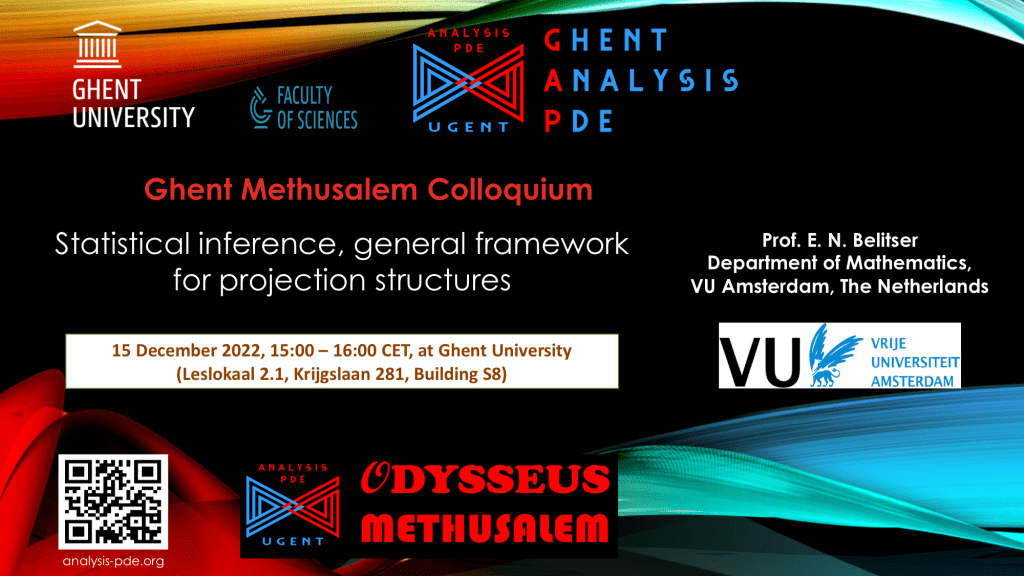
Abstracts of talks

Prof. Durvudkhan Suragan
Navarbayev University, Kazakhstan
Topic: On pointwise estimates for polyharmonic Green’s function
Time: 10:00 AM – 10:45 AM (CET) – 15 July 2022
Where: The venue is Leslokaal 3.1
Abstract: We talk about Maz’ya’s article “Seventy five (thousand) unsolved problems in analysis and partial differential equations”. Particularly, we discuss Problem 32 and give a simple proof for pointwise estimates for (Dirichlet) polyharmonic Green’s functions in balls with an arbitrary radius.
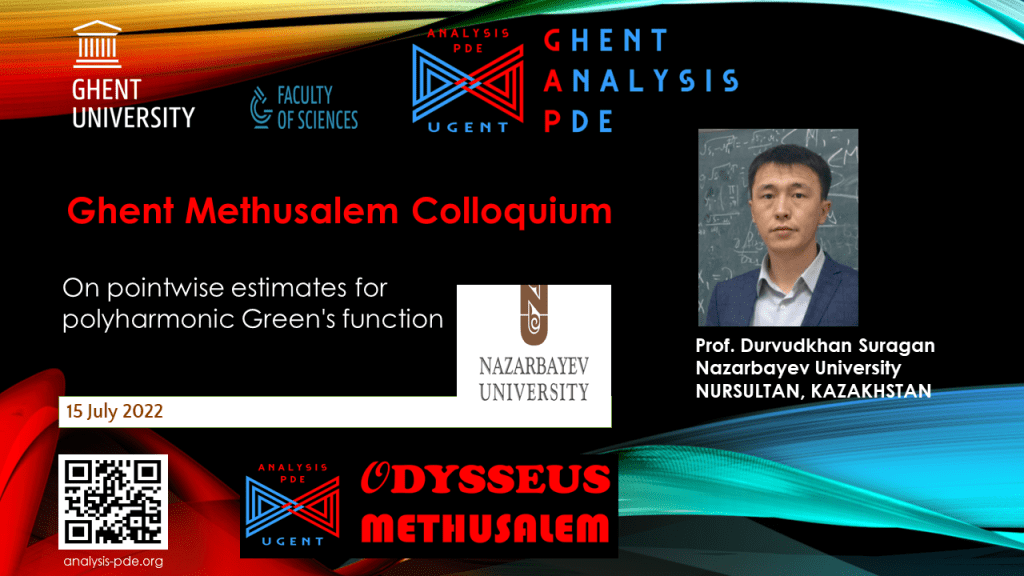
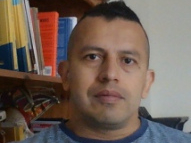
Prof. Julio Delgado
Universidad del Valle, Colombia
Topic: S(m,g) calculus and some applications
Time: 11:00 AM – 11:45 AM (CET) – 15 July 2022
Where: The venue is Leslokaal 3.1
Abstract: We will discuss some recent applications to the analysis of partial differential operators and PDEs in the setting of the S(m,g) calculus introduced by Lars Hörmander.
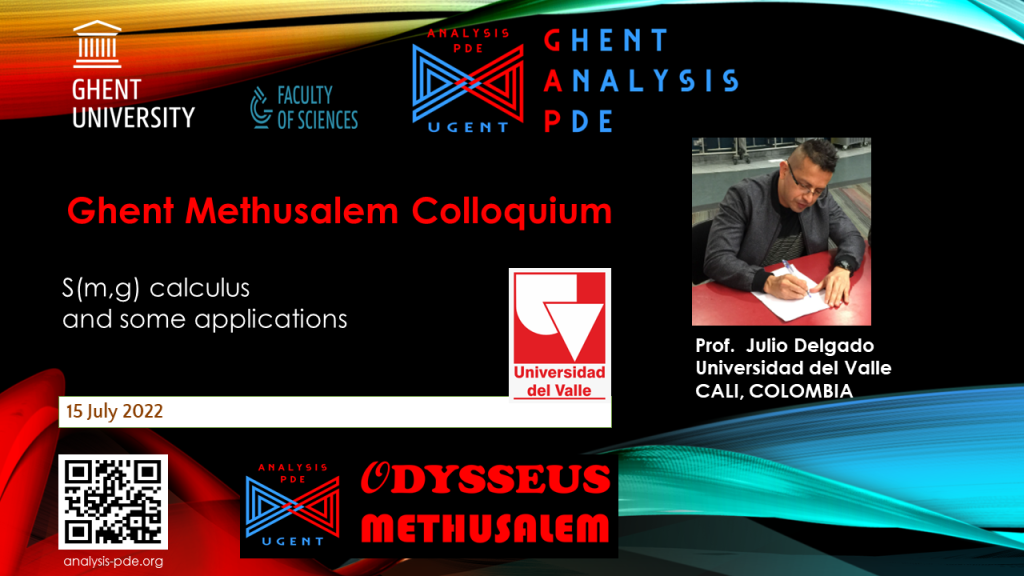
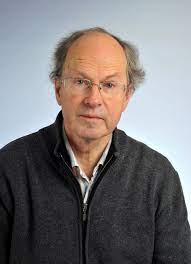
Prof. Johannes Sjostrand
The Institut de Mathématiques de Bourgogne, France
Topic: TBA
Time: 11:00 AM (CET) – 20 June 2022
Where: ZOOM
Abstract: TBA
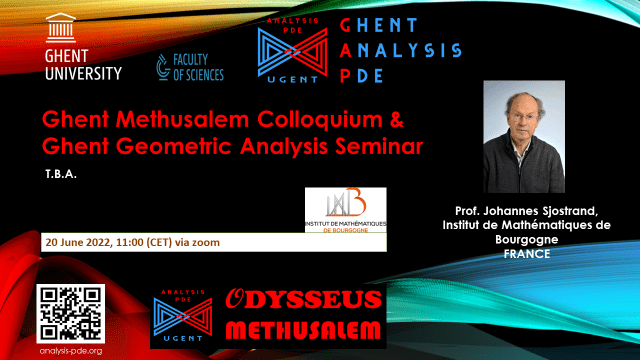
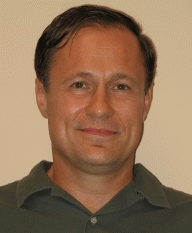
Prof. Victor Nistor
The Institut Élie Cartan de Lorraine, France
Topic: Analysis on non-compact manifolds and index theory
Time: 11:00 AM (CET) – 13 June 2022
Where: ZOOM
Abstract: I will review a general approach to analysis on singular and non-compact manifolds using Lie algebras of vector fields. I will begin by presenting, as a motivation, the case of the Laplace operator in cylindrical and then in spherical coordinates. This will justify the introduction of Lie manifolds, which is a class of manifolds that have a compactification to a manifold with corners and whose geometry is modeled by projective Lie algebras of vector fields. Lie manifolds can be used to study (in particular) the analysis on (asymptotically) euclidean, conical, cylindrical, and hyperbolic spaces. In the same vein, the desingularization of a polyhedral domain leads to a Lie manifold with boundary. As one of the main results, will recall the construction of a class of adapted pseudodifferential operators on a Lie manifold following Ammann, Lauter, and Nistor, a construction that extends earlier constructions of Connes and Melrose. Then I will discuss the Fredholm property of these pseudodifferential operators on Lie manifolds and the resulting index problem. Throughout the paper, we will distinguish three types of examples based on:
1. compact manifolds (the classical case which we want to generalize);
2. manifolds with cylindrical ends (the “almost classical case”, which again we want to generalize)
3. the rest of Lie manifold.
The second case plays a crucial role since it is easier to understand, and will thus be treated in more detail. I will conclude by formulating the problem of combining these definitions with the approach of Ruzhansky, a problem that arises in the analysis of G-invariant operators. The results presented here are joint works with: Ammann, Carvalho, Lauter, and Yu Qiao.

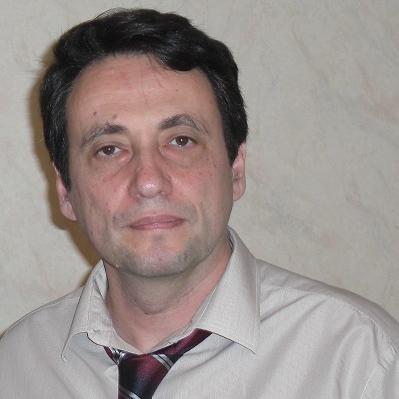
Prof. Vitaly Volpert
Institut Camille Jordan, University of Lyon, France
Topic: Mathematical Modeling of respiratory viral infections
Time: 3 PM (CET) – 1 June 2022
Where: Auditorium 1, S8, Ghent University
Abstract: Mathematical modelling of respiratory viral infections (including COVID-19) will be discusses, with a combination of modelling and analysis.
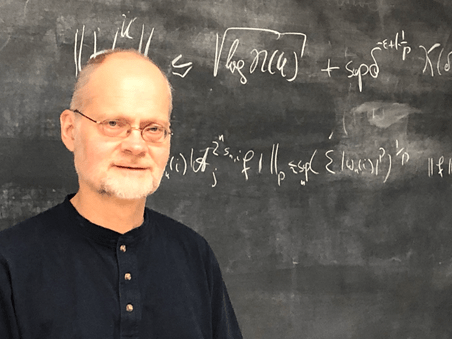
Prof. Andreas Seeger
University of Wisconsin-Madison, US
Topic: Lp improving bounds for maximal and variational operators associated with spherical means
Time: 2 PM (CET) – 18 April 2022
Where: ZOOM online-Ghent University
Abstract: This talk will be about spherical means with various recent results on Lp improving estimates for associated variational operators and maximal operators with restricted dilation sets. I will discuss how different notions of dimension of a dilation set enter in this problem.
Please email to for Zoom link: Duvan.CardonaSanchez@UGent.be
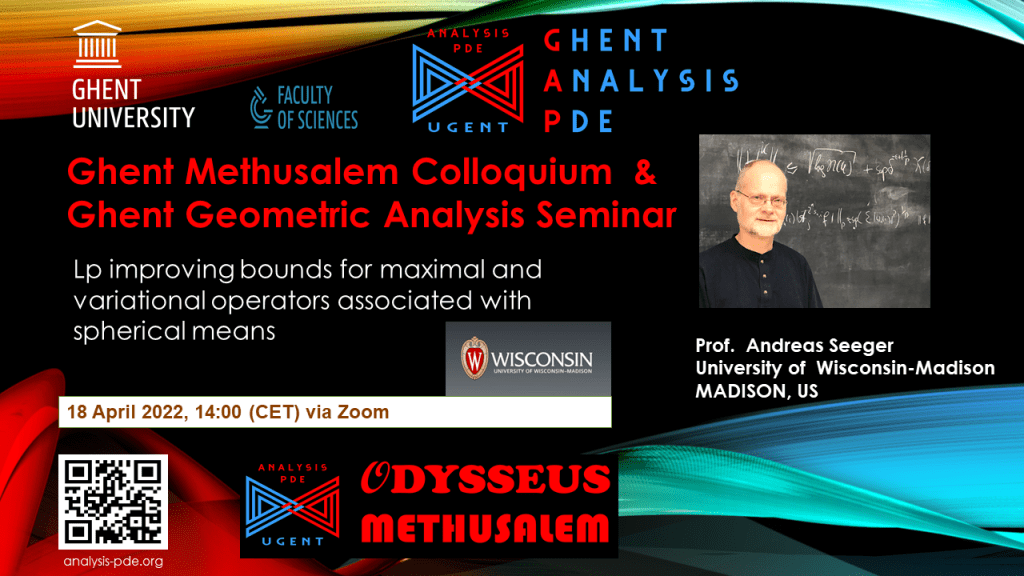
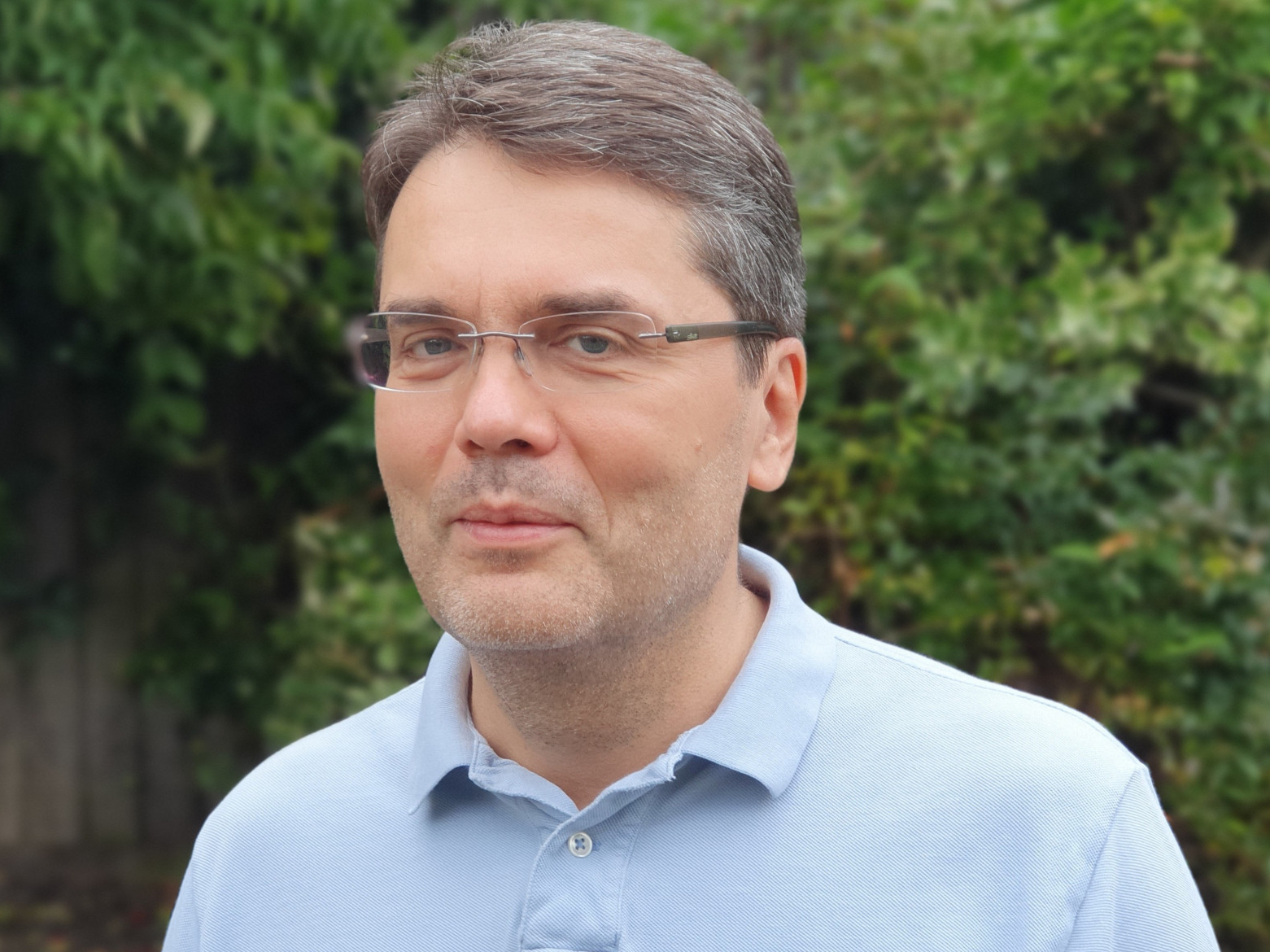
Prof. Eugene Shargorodsky
King’s College
London, UK
Topic: Estimates for pseudodifferential operators in terms of the norms of Fourier multipliers
Time: 20 April 2022
Where: Ghent University
Abstract: I will discuss methods of reducing the problem of boundedness of pseudodifferential operators (operators “with variable coefficients”) to the theory of Fourier multipliers (operators “with constant coefficients”). They allow one to obtain boundedness results for pseudodifferential operators under minimal restrictions on their symbols with respect to the Fourier variable. This is achieved by placing appropriate restrictions on the behaviour of the symbols with respect to the variable x. Optimality of the latter will also be discussed.

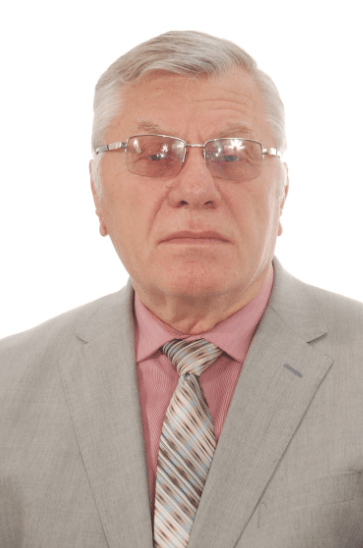
Prof. Roland Duduchava
University of Georgia
Tbilisi, Georgia
Topic: Convolution Equations on Lie Groups and Their Applications
Time: 20 April 2022
Where: Ghent University
Abstract: Lie group G is a manifold, equipped with the group structure-an associative multiplication of elements and all elements have inverses. On such Lie groups exists the unique Haar measure and is defined integration, as well as Fourier transformation F_G, which is an isomorphism of the Lebesgue-Hilbert spaces L2(G) to L2(G^), where G^ is the associated group of unitary representations.
Most interesting in applications are convolution equations on different Lie groups. The most known examples are Wiener-Hopf convolution equations, Mellin convolution equations and the discrete (Toeplitz) convolution equations, which play outstanding role in many applications.
The purpose of the presentation is to present a new type of convolution equations on the Lie group (-1,1), where the group operation for the pair 1<x,y<1 is defined as follows (x+y)(1+xy)-1. As a result emerge new type of convolution equations, which are solved precisely.
To the new class of convolution equations belong celebrated airfoil (Prandtl) equation,
singular Tricomi equation and Lavrentjev-Bitsadze equation, which encounter in many applications. Moreover, some partial differential equations fall in this class, including Laplace-Beltrami equation on the unit sphere.
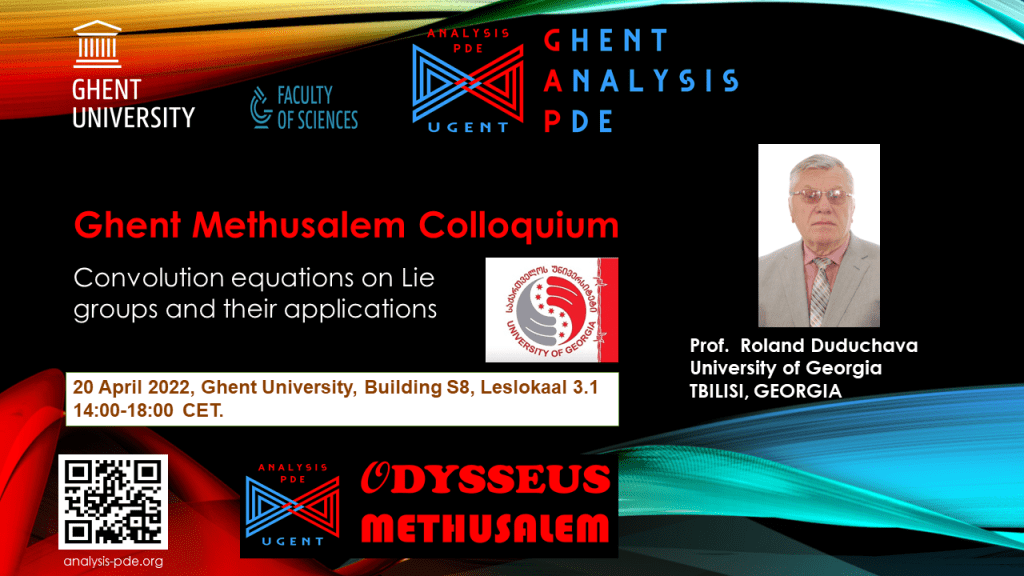
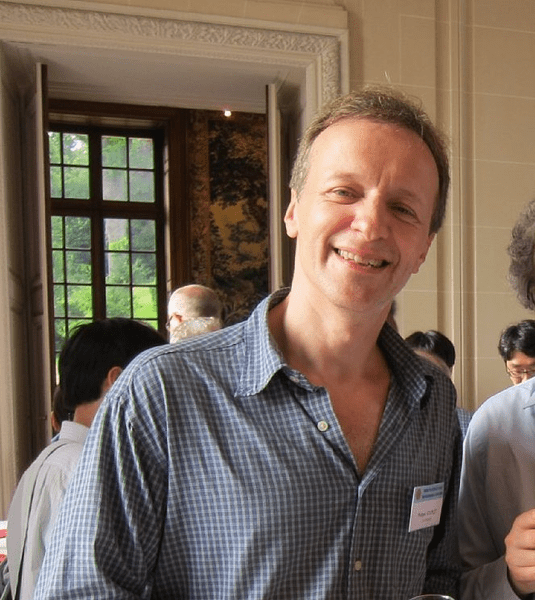
Prof. Philippe Souplet
Université Sorbonne
Paris Nord, France
Topic: Singularities of solutions of the diffusive Hamilton-Jacobi equation
Time: postponed
Where: Ghent University
We consider the diffusive Hamilton-Jacobi equation , with homogeneous Dirichlet conditions, which plays an important role in stochastic control theory, as well as in certain models of surface growth (KPZ). Despite its simplicity, it displays, in the surquadratic case
, a variety of interesting behaviors and we will discuss two classes of phenomena:
– Gradient blowup (GBU): boundary localisation of singularities, single point point blowup, blowup rates, space and space-time profiles, Liouville type theorems and applications;
– Continuation after GBU as a global viscosity solution: GBU with or without loss of boundary conditions (LBC), recovery of of boundary conditions (RBC) with or without regularisation, multiple time GBU and LBC
In particular, in one space dimension, we will present the, recently obtained, complete classification of GBU and RBC rates and profiles.
Based on a series of joint works with A. Attouchi, R. Filippucci, Y. Li, N. Mizoguchi, A. Porretta, P. Pucci, Q. Zhang.
Methusalem Workshop on Global Analysis
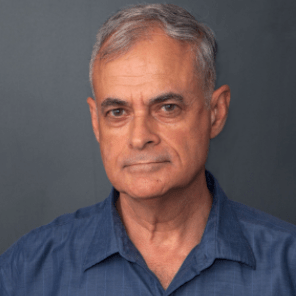
Prof. Todor D. Todorov
California Polytechnic State University
California, USA
Topic: Non-Standard Version of Egorov’s Algebra of Generalized Functions
Time: 11:00 – 12:00 CET, 6 October 2022
Where: Auditorium 1 Valére Billiet (Krijgslaan 281, Building S8, Ghent University)
We consider a non-standard version of Egorov’s algebra of generalized functions, which improves the properties of the generalized scalars and the embedding of Schwartz distributions in the original standard version. The embedding of distributions is similar to, but different from author’s works in the past and independently done by Hans Vernaeve. The emphases is on the simplicity and potential for axiomatization. We also define a regular subalgebra of generalized functions in the presence of Vernaeve’s counterexample.
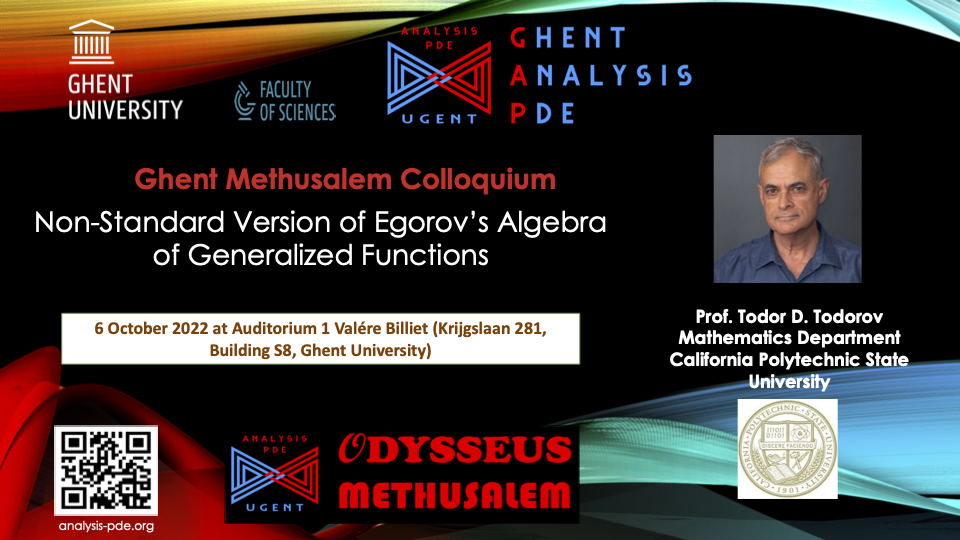
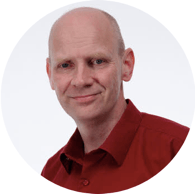
Prof. Joachim Toft
Linnaeus University
Sweden
Topic: Fractional Fourier transform, harmonic oscillator propagators and Strichartz estimates
Time: 14:00 – 15:00 CET, 6 October 2022
Where: Auditorium 1 Valére Billiet (Krijgslaan 281, Building S8, Ghent University)
We show that harmonic oscillator propagators and fractional Fourier transforms are essentially the same. We deduce continuity properties for such operators on modulation spaces, and apply the results to prove Strichartz estimates for the harmonic oscillator propagator when acting on modulation spaces.
Especially we extend some results in [1,2,3,4]. We also show that general forms of fractional harmonic oscillator
propagators are continuous on suitable Pilipović spaces. Especially we show that fractional Fourier transforms of any complex order can be defined, and that these transforms are continuous on any Pilipović space and corresponding distribution space, which are not Gelfand-Shilov spaces.
The talk is based on a joint work with Divyang Bhimani and Ramesh Manna.
References
[1] D. G. Bhimani The nonlinear Schrödinger equations with harmonic dinger equations with harmonic potential modulation spaces, Discrete Contin. Dyn. Syst. 39 (2019), 5923–5944.
[2] D. Bhimani, R. Balhara, S. Thangavelu Hermite multipliers on modulation spaces, in: Analysis and partial differential equations: perspectives from developing countries, Springer Proc. Math. Stat., 275, Springer, Cham, 2019, pp. 42–64.
[3] E. Cordero, K. H. Gröchenig, F. Nicola, L. Rodino Generalized metaplectic operators and the Schrödinger equation with a potential in the Sjöstrand class, J. Math. Phys. 55 (2014), 081506.
[4] E. Cordero, F. Nicola Metaplectic representation on Wiener amalgam spaces and applications to the Schrödinger equation, J. Func. Anal. 254 (2008), 506–534.
[5] J. Toft Images of function and distribution spaces under the Bargmann transform, J. Pseudo-Differ. Oper. Appl. 8 (2017), 83–139.
[6] J. Toft, D. Bhimani, R. Manna Fractional Fourier transforms, harmonic oscillator propagators and Strichartz estimates on Pilipović and modulation spaces, (preprint), arXiv:2111.09575.
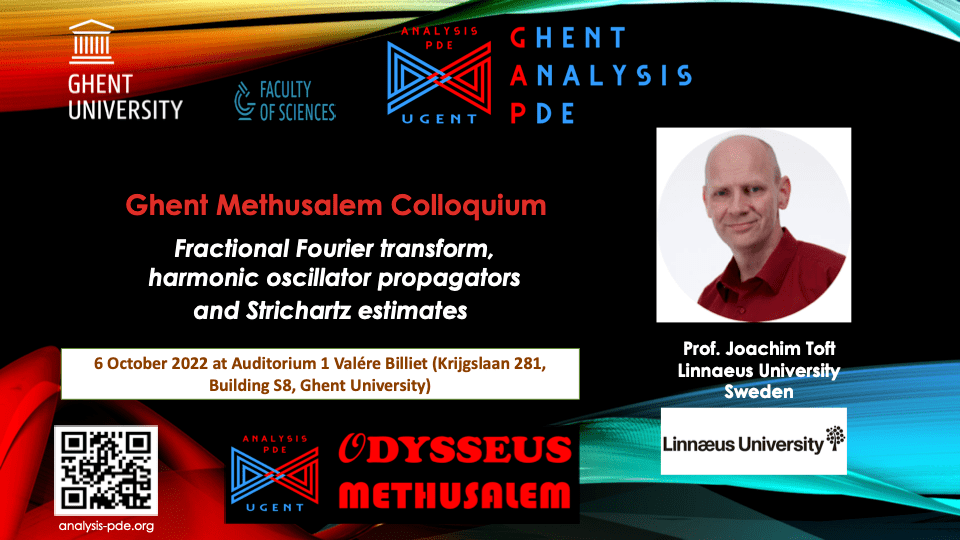
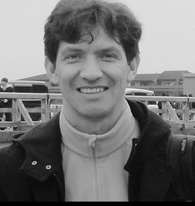
Prof. Alexander Cardona
Universidad de los Andes
Colombia
Topic: Kirillov’s construction, dequantization and pseudo-differential calculus
Time: 15:00 – 16:00 CET, 6 October 2022
Where: Auditorium 1 Valére Billiet (Krijgslaan 281, Building S8, Ghent University)
In this talk, we review the aspects of the Kirillov theory, and from the point of view of dequantization we analyze its interplay with the pseudo-differential calculus.
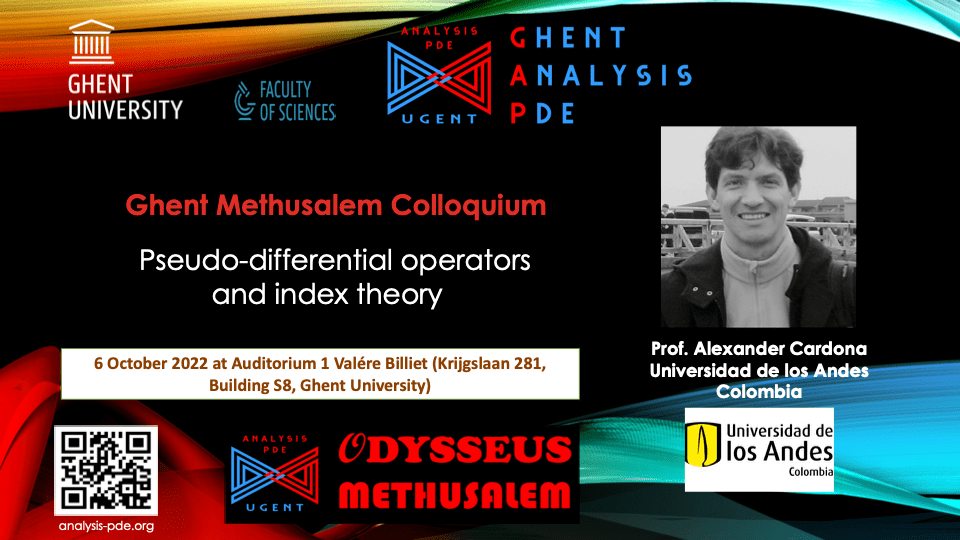
Colloquia
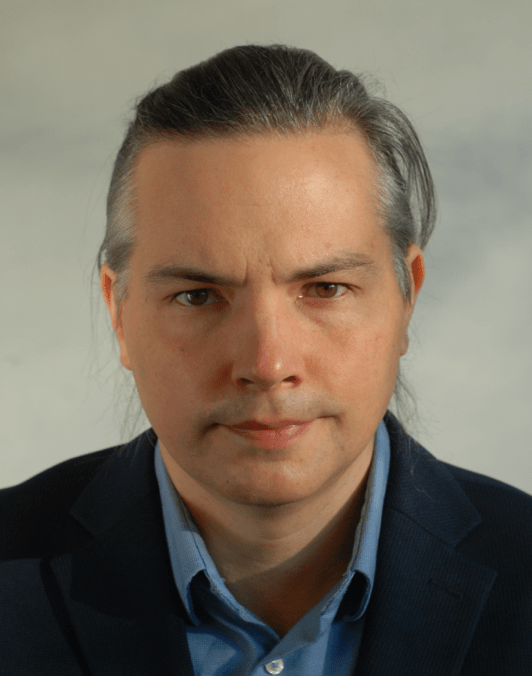
Prof. Jean VAN SCHAFTINGEN
Catholic University of Louvain
Belgium
Topic: Endpoint Sobolev inequalities for vector fields and cancelling operators
Time: 15:00 – 16:00 CET, 26 October 2022
Where: Auditorium Leslokaal 3.1 (Krijgslaan 281, Building S8, Ghent University)
Sobolev embeddings control the integrability of some power of a function by an integral of the derivative of the function at a lower power. The limiting case where the latter power is taken to be 1 due to Gagliardo and Nirenberg, is inaccessible to classical methods of harmonic analysis and turns out to be a functional version of the isoperimetric inequality. If one considers vector fields instead of functions, one can hope that some redundancy in the derivative would allow to obtain estimates with an integrand that does not involve all the components of the derivative. Such sparse estimates have been obtained for the deformation operator (M.J. Strauss) and for the Hodge complex (Bourgain and Brezis). I have characterized the homogeneous autonomous linear differential operators for which they hold as elliptic and canceling differential operator. I will also present various further questions that have been solved or remain as open problems.
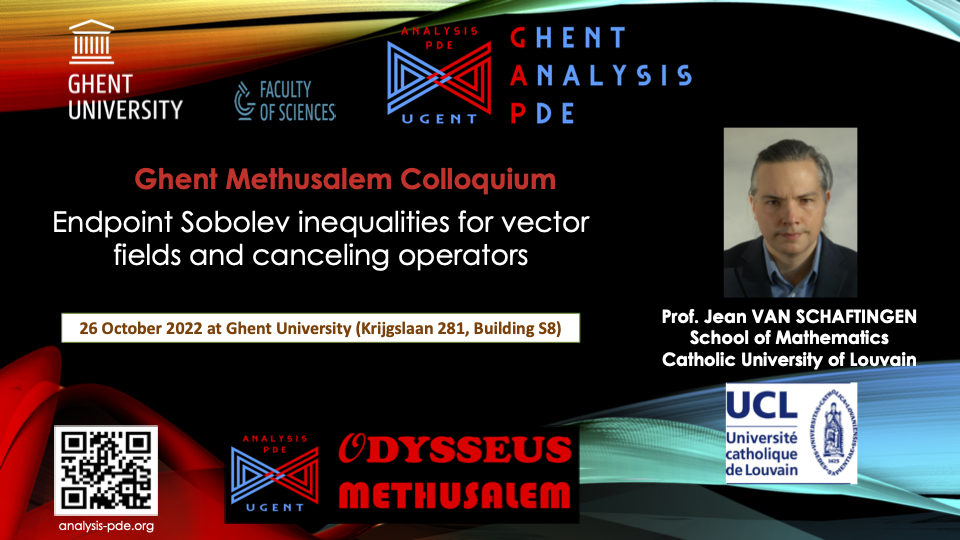
Methusalem Workshop on Functional Analysis
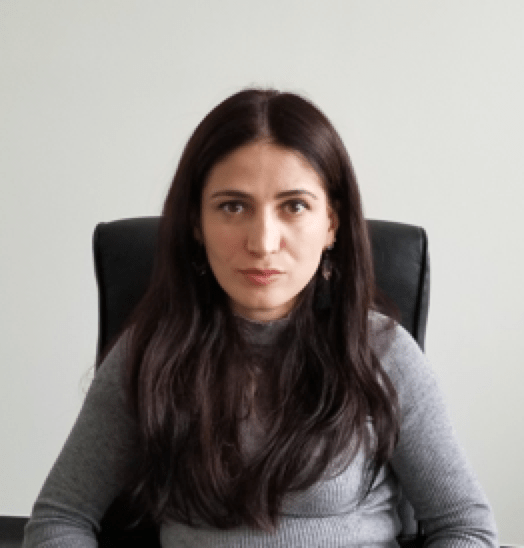
PhD Medea Tsaava
The University of Georgia, Georgia
Topic: Mixed boundary value problems for the Helmholtz equation in a model 2D angular domain
Time: 11:00 – 11:30 CET, 16 November 2022
Where: Leslokaal 1.2 (Krijgslaan 281, Building S8, Ghent University)
We have investigated the model mixed boundary value problem for the Helmholtz equation in a planar angular domain of magnitude
. The BVP is considered in a non-classical setting when a solution is sought in the Bessel potential spaces
,
,
. The problems are investigated using the potential method by reducing them to an equivalent boundary integral equation (BIE) in the Sobolev-Slobodečkii space on a semi-infinite axes
, which is of Mellin convolution type. By applying the recent results on Mellin convolution equations in the Bessel potential spaces obtained by V. Didenko & R. Duduchava, explicit conditions of the unique solvability of this BIE in the Sobolev-Slobodečkii
and Bessel potential
spaces for arbitrary
are found and used to write explicit conditions for the Fredholm property and unique solvability of the initial model BVPs for the Helmholtz equation in the above mentioned non-classical setting.
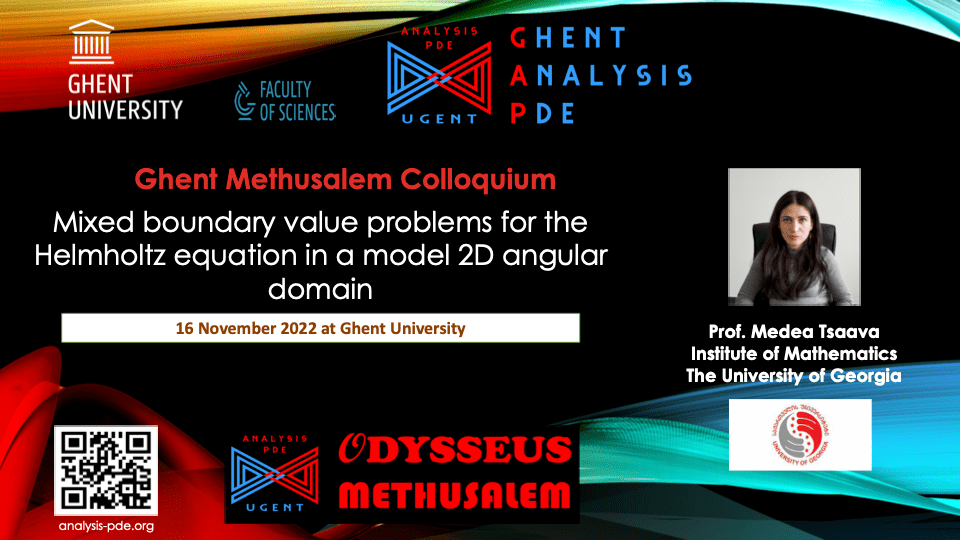

PhD student: Margarita Tutberidze
The University of Georgia, Georgia
Topic: Mixed and transmission type boundary value problems for the Helmholtz equation on a surface with Lipschitz boundary
Time: 11:30 – 12:00 CET, 16 November 2022
Where: Leslokaal 1.2 (Krijgslaan 281, Building S8, Ghent University)
We have studied the solution of a transmission type boundary value problem for the anisotropic Helmholtz equation in the non-classical setting on a surface with Lipschitz boundary. At first the problem is reduced by the localization method (cf. [1]) to several model problems at flat angles consisting of two and three beams emerging from point 0. Mixed type (Dirichlet-Neumann) boundary conditions on the boundary beams and transmission condition on the interface beam are given. We apply the potential method and reduce the boundary problem to the system of boundary integral equations, which represent a system of Mellin-type convolution equations in the Bessel potential space on the half-axis. By using the resent results on such equations, obtained in (cf. [2]), we write symbol of equations and formulate criteria for solvability (Fredholmness) of such systems of equations in the Bessel potential spaces.
For the model angle the mixed type BVP were investigated in [3]. We obtain necessary and sufficient conditions for the solvability of the model BVP for two angles with the interface along a beam. The final result is the solvability criteria for the mixed type BVP for the anisotropic Helmholtz equation in the non-classical setting on a surface with interface and with Lipschitz boundary.
References
[1] T. Buchukuri, R. Duduchava, D. Kapanadze and M. Tsaava, Localization of a Helmholtz boundary value problem in a domain with piecewise-smooth boundary, Proc. A. Razmadze Math. Inst, 162, 37-44, (2013).
[2] V. Didenko and R. Duduchava, Mellin convolution operators in Bessel potential spaces with admissible meromorphic kernels. Journal of Analysis and Applications, 443, 2016, 707-731.
[3] R. Duduchava, M. Tsaava, Mixed boundary value problems for the Laplace-Beltrami equation. Complex Variables and Elliptic Equations, 63, 10, 2018, 1468-1496
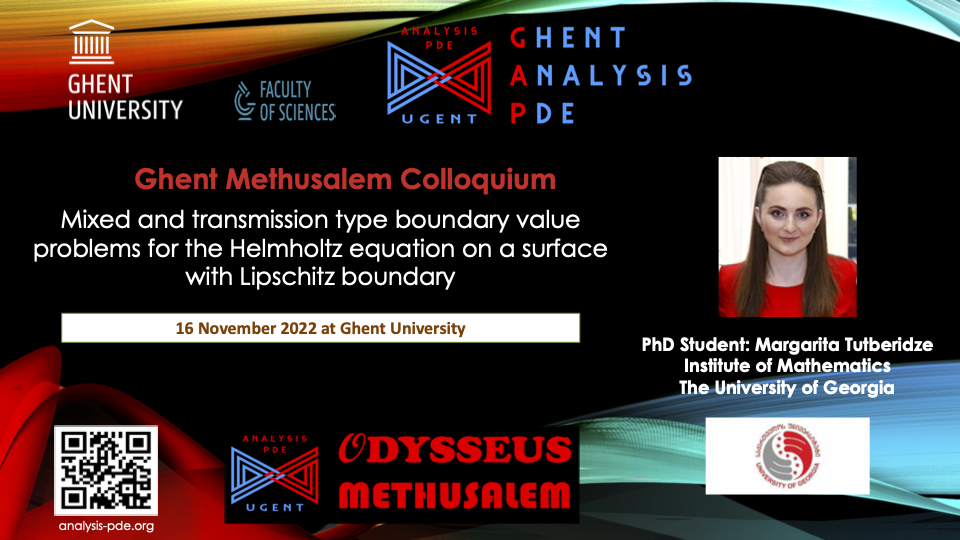
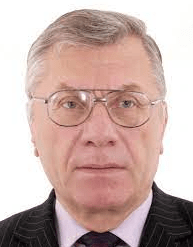
Prof. Roland Duduchava
The University of Georgia, Georgia
Topic: BVPs on Lipschitz domains in the Bessel potential spaces
Time: 14:00 – 14:30 CET, 16 November 2022
Where: Leslokaal 1.2 (Krijgslaan 281, Building S8, Ghent University)
Studying Boundary Value Problem on Lipschitz domain (or a Lipschith surface
) we encounter problem with spaces. If the BVP is considered in the Bessel potential space
Lac-Milgram Lemma guarantees the existence of a weak solution, but we can not conclude even continuity of a classical solution. To establish continuity of a solution, we will study BVPs in the Bessel potential space
,
,
.
We apply two different Bessel potential spaces, defined by A) Fourier transforms (the classical case); B) By Mellin transform
.
For the investigation of BVPs in the Bessel potential spaces of both types we apply localization, obtaining model problems in angles. The obtained model problems is reduced further to convolutions on the half axes and study this problem by lifting them to the space setting
.
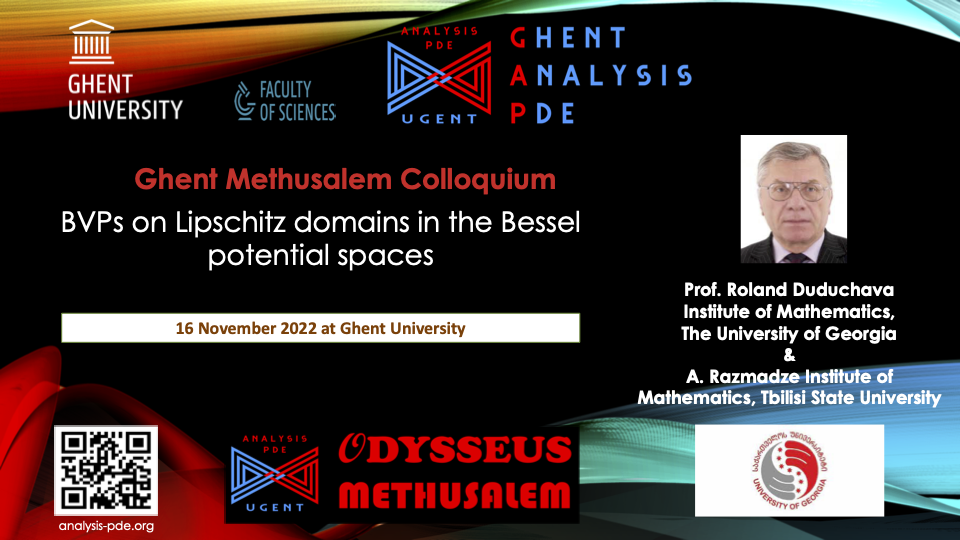
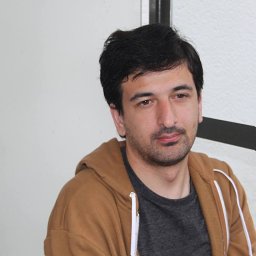
Prof. George Tephnadze
The University of Georgia, Georgia
Topic: Almost everywhere convergence of partial sums and certain summability methods of trigonometric and Vilenkin systems
Time: 14:30 – 15:00 CET, 16 November 2022
Where: Leslokaal 1.2 (Krijgslaan 281, Building S8, Ghent University)
The classical theory of Fourier series deals with decomposition of a function into sinusoidal waves. Unlike these continuous waves the Vilenkin (Walsh) functions are rectangular waves. There are many similarities between these theories, but there exist differences also. Much of these can be explained by modern abstract harmonic analysis, combined with martingale theory.
This talk is devoted to investigating tools which are used to study almost everywhere convergence of the partial sums of trigonometric and Vilenkin systems. In particular, these methods combined with martingale theory helps to give a simpler proof of an analogy of the famous Carleson-Hunt theorem for Fourier series with respect to the Vilenkin system. We also define an analogy of Lebesgue points for integrable functions and we will describe which certain summability methods are convergent in these points.

Methusalem Mini-Course on Spectral Asymptotics
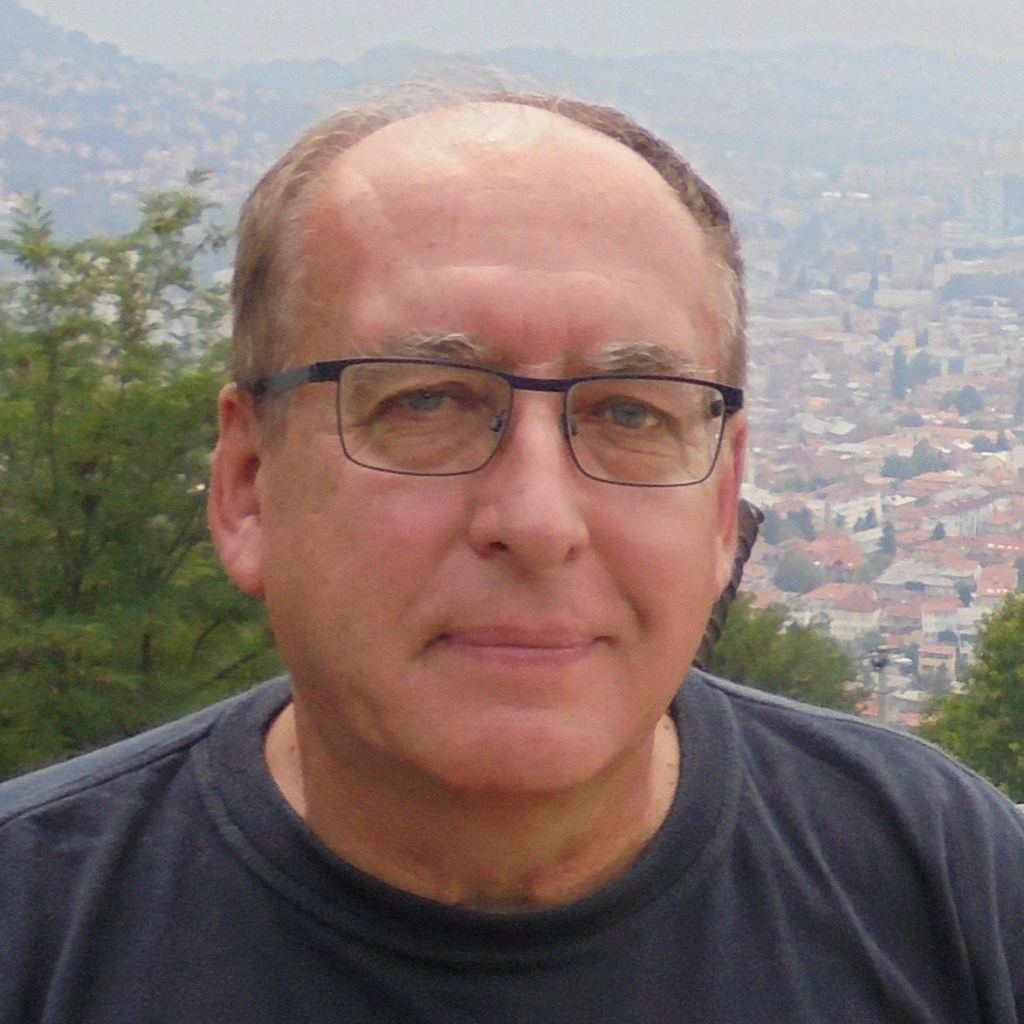
Prof. Dmitri Vassiliev
University College London, UK
Topic: Spectral theory of differential operators: what’s it all about and what is its use
First Session: 14:00 – 15:30 CET, 22 November 2022
Where: Leslokaal 3.1 (Krijgslaan 281, Building S8, Ghent University)
Second Session: 10:30 – 12:00 CET, 24 November 2022
Where: Leslokaal 2.2 (Krijgslaan 281, Building S8, Ghent University)
I will give an overview of the spectral theory of partial differential operators, charting its development from the non-rigorous works of physicists to modern rigorous mathematical results.
Methusalem Mini-Course on Principles of Machine Learning

Dr. Sven Nõmm
Tallinn University of Technology, Estonia
Topic: Principles of Machine Learning
First Session: 10:30 – 12:00 CET, 6 December 2022
Where: Leslokaal 1.2 (Krijgslaan 281, Building S8, Ghent University)
Second Session: 14:00 – 15:30 CET, 8 December 2022
Where: Leslokaal 1.2 (Krijgslaan 281, Building S8, Ghent University)
The mini course is devoted to the introduction and main practical principles of statistical machine learning. The first session will introduce two main types of machine learning problem, supervised- and unsupervised-learning. Also, we will discuss in detail typical workflow of machine learning. The second session will present more advanced approaches to improving model quality and introduce simple artificial neural networks.
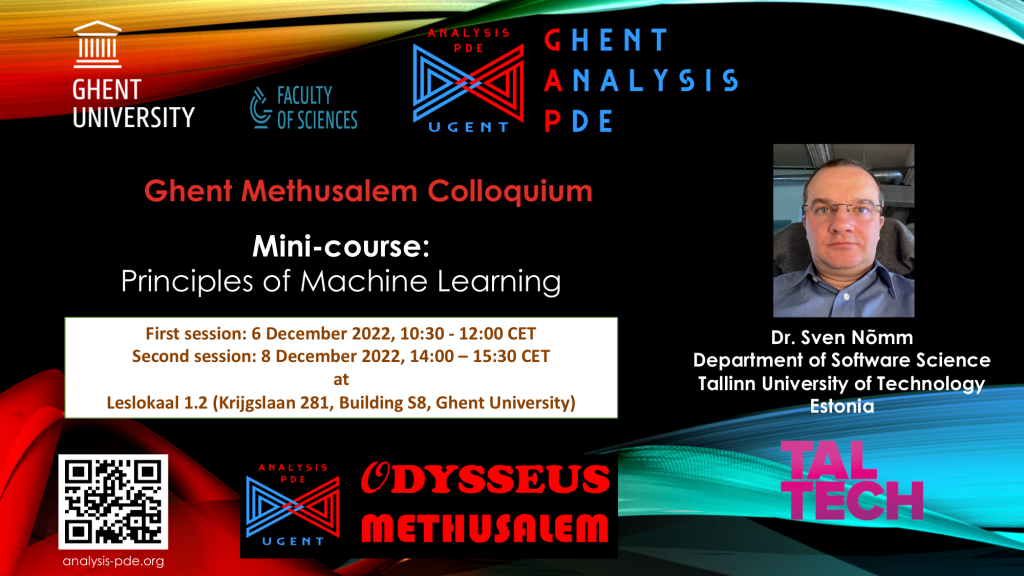
Methusalem Colloquium Lecture: Machine learning supported diagnostics of the Parkinson’s disease
Time: 14:00 – 15:00 CET, 6 December 2022
Where: Leslokaal 1.2 (Krijgslaan 281, Building S8, Ghent University)
